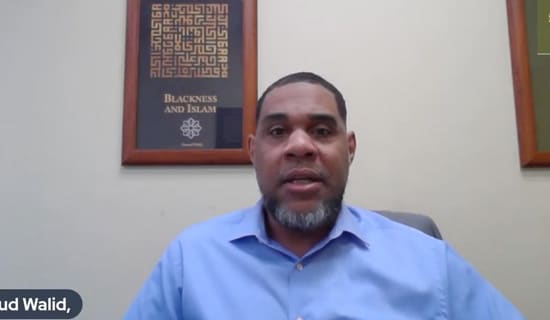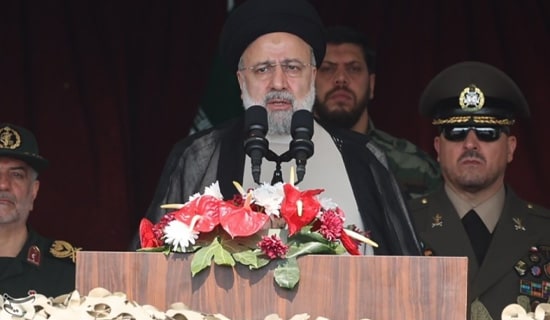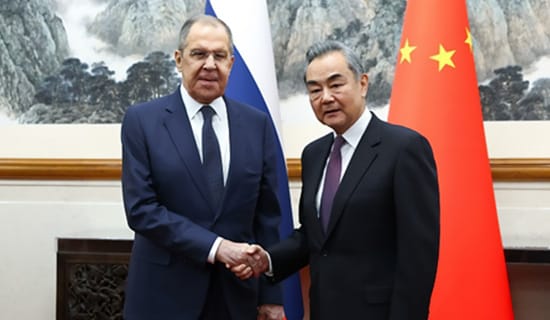Introduction
For more than a year, Indonesia, which is the largest Islamic country and is often overlooked due to the West's focus on the Arab world, has sought an international role, notably through mediation efforts involving the Islamic Emirate of Afghanistan, the Taliban organization that ruled Kabul from 1996 to 2001. This paper examines the recent trajectory of the relationship between Indonesia and the Afghan Taliban, not between Indonesia and Afghanistan.
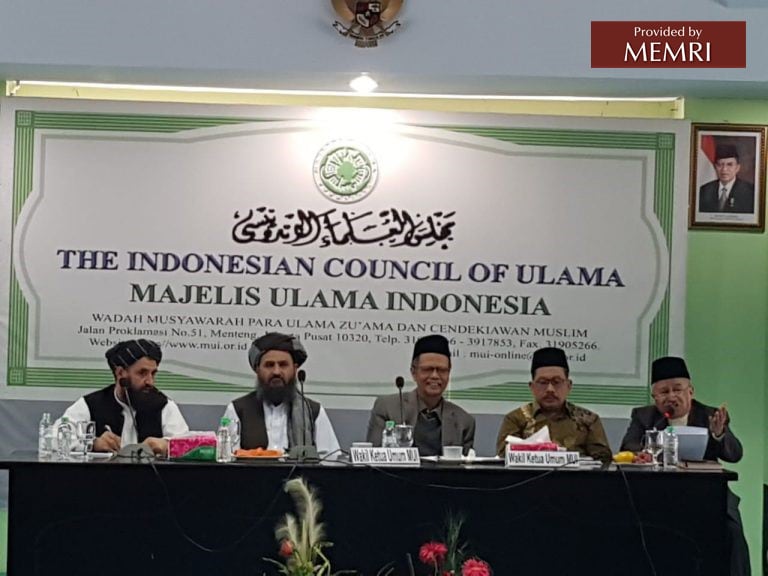
Deputy Taliban Leader Mullah Baradar Akhund (second from left) at a meeting hosted by Majlis-e-Ulama of Indonesia.
On July 26, 2019, Zabihullah Mujahid, spokesman of the Islamic Emirate, announced that Mullah Abdul Ghani Baradar Akhund, the deputy leader of the Afghan Taliban, was leading an eight-member delegation from their Qatar-based Political Office for a meeting with Indonesian leaders.[1] The spokesman said that the trip's focus was "on building good political relations" between Afghanistan and Indonesia and to achieve "peace and cooperation for future Afghanistan."[2]
Countries that have been active regarding the Taliban in recent years include: the U.S., Qatar, Russia, Iran, Turkey, Germany, Norway, China, Uzbekistan, Japan, and Indonesia. The terror group acquired diplomatic legitimacy mainly due to its direct talks with the U.S. in Doha, Qatar. The legitimacy accorded by the U.S.-Taliban talks has helped these countries, including Indonesia, to stop viewing the Islamic Emirate as a jihadi terror organization.
Mullah Baradar Akhund, the deputy leader of the Islamic Emirate and head of its Political Office in Doha who headed the delegation to Indonesia, had been detained in a joint U.S.-Pakistani intelligence operation near Karachi in February 2010, allegedly for engaging in talks with the Afghan government without Pakistan's nod.[3] He was technically released in September 2013 and placed in a safe house in Pakistan.[4]
In October 2018, he was released from Pakistani detention and moved to Doha to facilitate the U.S.-Taliban talks.[5] Though the Taliban denied any deal for his release, it is believed that there was some quid pro quo that favored Pakistan. In January 2019, Mullah Baradar Akhund was appointed as the head of the Doha-based Political Office, replacing Sher Mohammad Abbas Stanekzai, who until then had led the Taliban's talks with U.S. and other nations.[6]
The Taliban's Reluctant Engagement With Indonesia
Indonesia's involvement with the Taliban began in 2018. Initially, the Taliban, suspicious of the U.S.-backed conferences of Islamic scholars on the Afghan issue, criticized Indonesia's role on Afghanistan. On May 11, 2018, Indonesia organized a meeting of Islamic scholars from Afghanistan, Pakistan, and Indonesia in Bogor city where Pakistani clerics represented the Taliban symbolically.
On March 10, two months before the Bogor conference, the Islamic Emirate warned the ulama ("Islamic scholars") against attending the meeting or issuing a fatwa ("Islamic decree") against the Afghan jihad. It reminded them that after 9/11 the "historical Western enemy of Islam formed a coalition under the leadership of America and declared their enmity with the Islamic Emirate" and "launched a military invasion on our independent Islamic homeland."[7] A fatwa was issued by 1,500 Islamic scholars for the jihad against America that has been underway in Afghanistan since 2001, it said, and asked those set to meet in Bogor to refrain from "legitimizing the stooge Kabul regime... by passing preposterous fatwas."[8]
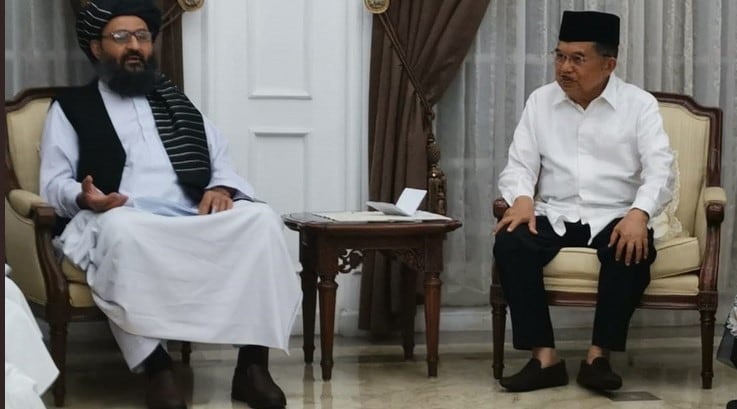
Mullah Baradar Akhund meets with Vice President Jusuf Kalla in Jakarta on July 27, 2019.
Ultimately, the conference did not issue a fatwa against the Afghan jihad. However, Points Six, Seven, and 11 of a declaration issued at the Bogor conference stressed the role of the ulama in resolving the Afghan issue, stating that the Ulama are "Warasatul Anbiya [inheritors of prophets]," who "can play an active role in promoting peace and solidarity in the Muslim world, especially in Afghanistan," and "support the important role of Ulama of Afghanistan, Indonesia, and Pakistan in promoting peace, harmony, and brotherhood among the Ummah in the light of Islamic teachings based on Koran and Sunnah [traditions of Prophet Muhammad]."[9]
On May 17, 2018, just days after the conference at which an anti-jihad fatwa was not issued, the Islamic Emirate issued a statement, titled "What did the Indonesia conference prove?"[10] It noted: "Even though the conference was convened at the request and expense of the United States and her political backers, but the scholars still refused to pass a fatwa against the ongoing jihad. From this one can clearly deduct that the ongoing jihad against the American occupation is a reality which no sane person will ever dare deem illegitimate."[11]
The failure of the Bogor conference to issue a fatwa against jihad may have convinced the Taliban to engage with Indonesia, and a meeting followed. A delegation led by Sher Mohammad Abbas Stanekzai, then head of the Political Office in Doha, visited Indonesia on August 12-15, 2018.[12] It held meetings "about achieving peace in Afghanistan and the withdrawal of foreign forces" with Indonesian Vice President Muhammad Jusuf Kalla, Minister for Foreign Affairs Retno Marsudi, and Indonesia's Special Representative for Afghanistan Hamid Awaludin.[13]
Mullah Baradar Akhund's Visit To Indonesia
The president of Indonesia and the president of Afghanistan have paid reciprocal visits in recent years. However, by engaging with Indonesia and other nations directly, the Taliban now act as if they are the government of Afghanistan. Their trips to foreign nations offer them a diplomatic legitimacy they did not have even during 1996-2001, when they were in power in Kabul but were recognized diplomatically by only three countries: Pakistan, the UAE, and Saudi Arabia.
On April 30, 2019, Mullah Baradar Akhund, the new head of the Political Office, held a meeting with Retno Marsudi, the visiting Indonesian Minister for Foreign Affairs, in Doha, Qatar.[14] In meeting with the Taliban, the Indonesian government treated the Taliban as if they were on a par with the Afghan government. The Taliban spokesman Zabihullah Mujahid noted in a statement that both the sides exchanged views "about peaceful resolution to the Afghan issue" and the U.S.-Taliban talks.[15] According to the statement, the Indonesian minister "assured assistance" and promised to play "a positive role in resolving the Afghan issue if needed."[16]
Indonesia's engagements with the Taliban have come a long way since the Bogor conference. Having secured assurances of a positive role from Indonesian government leaders, Mullah Baradar Akhund led an eight-member delegation to Indonesia, having left from Qatar on July 26, 2019. Mullah Baradar Akhund's discussions began with a meeting with Indonesian Vice President Jusuf Kalla at his official residence in Jakarta on July 27.[17] On the same day, the Taliban delegation visited the Sunda Kelapa Mosque in Jakarta for evening prayers and later held another round of dinner meetings with Kalla and Retno Marsudi.[18]
On July 27, Mullah Baradar Akhund also visited the Jakarta-based headquarters of Nahdlatul Ulama, the largest Islamic organization of Indonesia with 60 million members. Abdul Manan Ghani, the chairman of Nahdlatul Ulama, told reporters: "We conveyed our views that they should prioritize dialogue among the factions in Afghanistan and should not let other countries to meddle and compromise an already fragile situation there."[19]
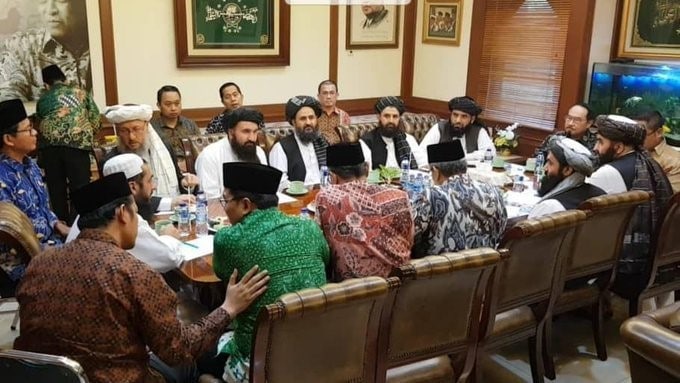
The Taliban delegation held a meeting with Islamic clerics from Nahdlatul Ulama.
SUPPORT OUR WORK

According to a Taliban website, the Mullah Baradar Akhund-led delegation attended a conference in the afternoon of July 30, 2019, with scholars and experts at the headquarters of the government-backed Majlis-e-Ulama of Indonesia in Jakarta.[20] The Taliban delegation "highlighted the current situation of Afghanistan, policy, and achievements of the Islamic Emirate," while the Indonesian Islamic scholars "appreciated the sacrifices of the Islamic Emirate and the Afghan mujahideen, offered their views and suggestions and also prayed for further success."[21]
Muhyiddin Junaidi, the head of the international relations department of the Majlis-e-Ulama of Indonesia, was quoted as saying: "We would like to help create peace in Afghanistan in accordance with our capacity as an organization and to complement the government's diplomatic efforts."[22] Junaidi also said: "We shared ideas on how to respond to various social, economic, and cultural problems that Muslims face."[23] Majlis-e-Ulama of Indonesia also offered scholarships for Afghan students to study in Indonesia's Islamic boarding schools and universities.[24]
Indonesia's Search For Influence In The Islamic World
A key achievement for Indonesia is that the Taliban, who were reluctant to engage with Islamic scholars from Afghanistan, Pakistan, and Indonesia at the Bogor conference of May 2018, are now expected to officially attend the next iteration of this trilateral conference in the next few months. Yunahar Ilyas, vice-chair of the Majlis-e-Ulama of Indonesia, confirmed that the Taliban will attend, but a location and exact date was yet to be finalized.[25] "This time, they will officially attend. We hope that peace in Afghanistan can be realized," Ilyas added.[26]
At the center of Indonesia's engagement with the Islamic Emirate is Vice President Jusuf Kalla. Although the Indonesian government has not been releasing details about its engagement with the Taliban, some information does emerge in the media. Zaitun Rasmin, the deputy secretary-general of Majlis-e-Ulama of Indonesia, said: "This Taliban attendance cannot be separated from the role of Vice President Jusuf Kalla, who has been persistent (in inviting the Taliban)."[27]
Rasmin added: "The vice president (of Indonesia) always said that there could be no peace without the Taliban's maximal involvement and power-sharing with Kabul."[28] However, it was also a belief of the Indonesian government that the Taliban could not be involved in peace process without an effective role played by Indonesian Islamic scholars. "Now they [the Taliban] are convinced by the Indonesian government and clerics," Rasmin noted.[29]
Praising Indonesia's engagement with the Taliban, the editorial board of The Jakarta Post said: "The nation is bound, as stipulated in the opening of the 1945 Constitution, to 'participate toward the establishment of a world order based on freedom, perpetual peace, and social justice...' This has been the evergreen mantra for Indonesia's diplomatic corps, especially with regard to its undying support of Palestinian statehood and a two-state solution to the Middle East crisis."[30]
The editorial board also recommended that such an important meeting between Vice President Kalla and Mullah Baradar Akhund should not have been kept "closely guarded" because it "serves as a testament to Indonesia's growing international stature."[31] Agung Nurwijoyo, an international relations expert at the University of Indonesia, observed: "Jakarta's diplomacy in Afghanistan was meant to bolster its influence not only in the global context but also in the Islamic world."[32]
* Tufail Ahmad is Senior Fellow for the MEMRI Islamization and Counter-Radicalization Initiative
[1] Twitter.com/Zabehulah_M33, July 26, 2019.
[2] Twitter.com/Zabehulah_M33, July 26, 2019.
[3] MEMRI JTTM report Afghan Taliban Welcome Mullah Baradar's Release, Deny 'Any Sort Of Deal', October 26, 2018.
[4] MEMRI JTTM report Afghan Taliban Welcome Mullah Baradar's Release, Deny 'Any Sort Of Deal', October 26, 2018.
[5] MEMRI JTTM report Afghan Taliban Welcome Mullah Baradar's Release, Deny 'Any Sort Of Deal', October 26, 2018.
[6] MEMRI JTTM report Afghan Taliban Appoint Mullah Baradar As Head Of Political Office In Qatar, January 31, 2019.
[7] AlemarahEnglish.com, March 10, 2019.
[8] AlemarahEnglish.com, March 10, 2019.
[9] Gmic.gov.af, May 12, 2018.
[10] AlemarahEnglish.com, May 17, 2019.
[11] AlemarahEnglish.com, May 17, 2019.
[12] AlemarahEnglish.com, August 17, 2018.
[13] AlemarahEnglish.com, August 17, 2018.
[14] AlemarahEnglish.com, May 1, 2019.
[15] AlemarahEnglish.com, May 1, 2019.
[16] AlemarahEnglish.com, May 1, 2019.
[17] Benarnews.org, July 31, 2019.
[18] TheJakartaPost.com, July 30, 2019.
[19] Benarnews.org, July 31, 2019.
[20] AlemarahEnglish.com, July 30, 2019.
[21] AlemarahEnglish.com, July 30, 2019.
[22] Benarnews.org, July 31, 2019.
[23] Benarnews.org, July 31, 2019.
[24] Benarnews.org, July 31, 2019.
[25] Aa.com.tr, July 30, 2019.
[26] Aa.com.tr, July 30, 2019.
[27] Aa.com.tr, July 30, 2019.
[28] Aa.com.tr, July 30, 2019.
[29] Aa.com.tr, July 30, 2019.
[30] TheJakartaPost.com, July 31, 2019.
[31] TheJakartaPost.com, July 31, 2019.
[32] TheJakartaPost.com, July 30, 2019.


